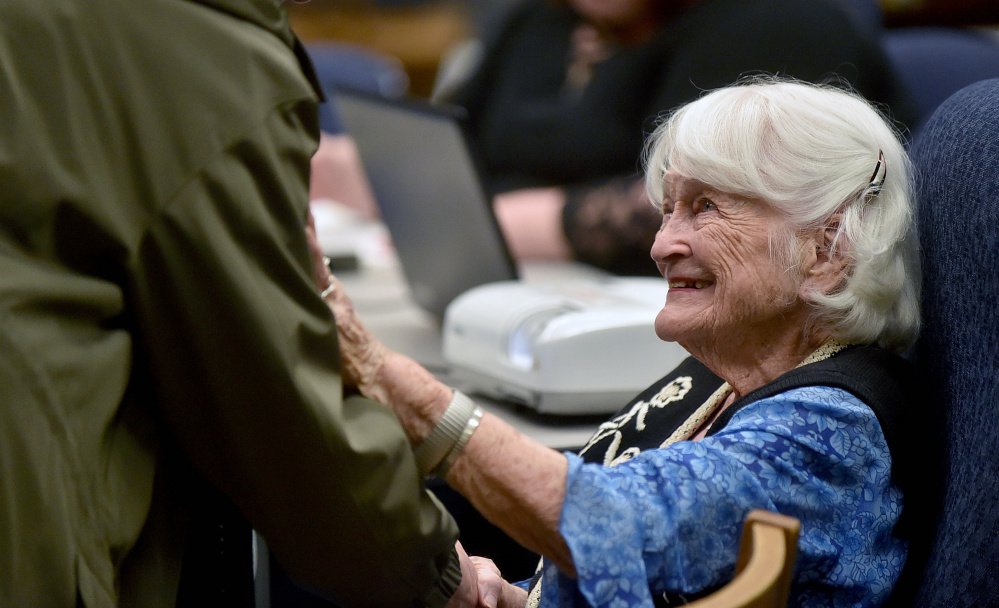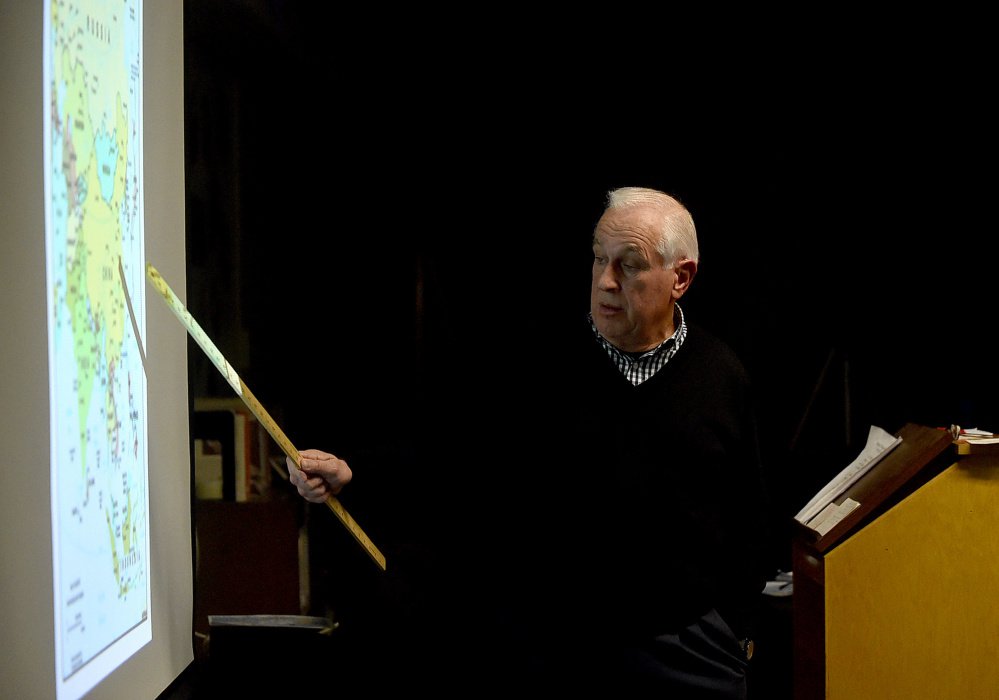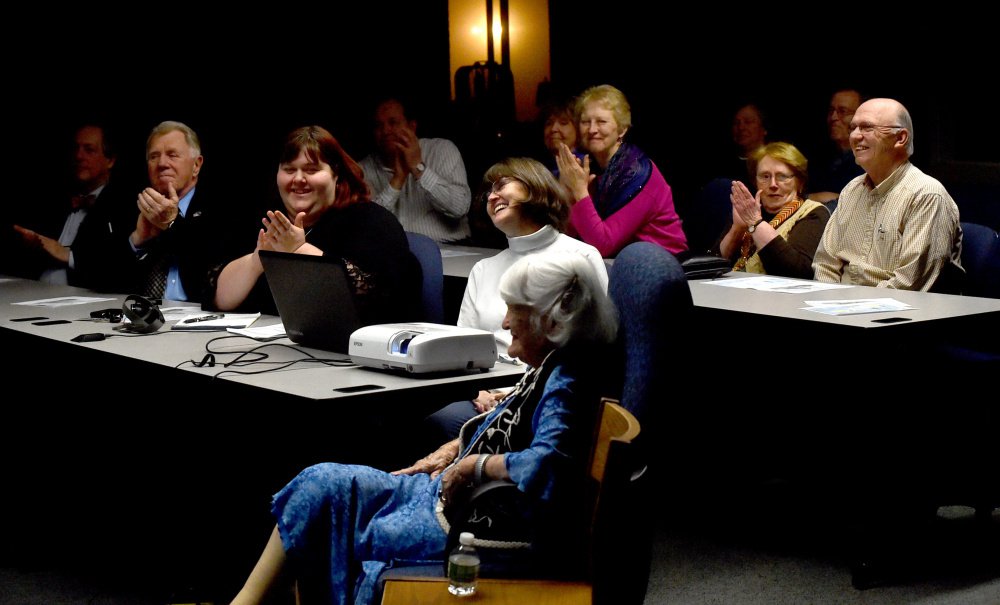FAIRFIELD — Eugene Wing’s story began in 1883 right here in Fairfield. He probably was a third-generation native of the town. And his story ended 60 years later, on an island in the Philippines. How he got there though, was quite a story — one that involves a strong business acumen, a devotion to his country and perhaps even a little espionage.
On Wednesday night, a handful of people gathered in the Lawrence Junior High School library to honor Wing, who was called “one of Fairfield’s native sons” by Douglas Cutchin, president of the Fairfield Historical Society, the group that put on the event.
“His story is remarkable and gripping,” Cutchin said to the gathered group, which included Wing’s only child, 101-year-old Hope Wing Weston, who was there to receive a certificate of proclamation. “I will try to do it justice.”
Cutchin gave an overview of Wing’s life, saying he was educated at Bowdoin College before going on to study at the University of Oxford in England under a Rhodes Scholarship. It was there, in 1906, he came to the attention of the International Banking Corp., one of the world’s largest banking firms. After he completed his studies, IBC sent him to Manila, Philippines, to work in the company’s Far East banking headquarters. In just a few years, he was vice president of the entire IBC Asian banking system.
It was during his time in the Philippines that Wing gathered a vast knowledge of the banking systems and business communities. He was then approached by the U.S. Army Intelligence Service and was “asked to provide information that would shed light on events and trends that could impact the USA’s interests in Southeast Asia,” Cutchin said. Wing agreed. Wing did this during World War I, and he continued to gather and provide information to the U.S. Army Intelligence Service.
Cutchin said Wing ramped up his devotion and commitment to his country leading up to World War II, when, Cutchin said, Japan was building up its foreign policy and military aggressively in an effort to dominate Southeast Asia. Around 1940, he sent his wife back to Maine to be with their daughter as she gave birth to their first grandchild. It was at that time, Cutchin said, that Wing informed the U.S. Army that “he was quite sure that the Japanese would threaten the Philippines — not only with its navy, but probably with landing army units at key locations on the island.”
Leading up to the attacks on Pearl Harbor on Dec. 7, 1941, Cutchin said there are a number of things known about Wing. He knew how the entire banking and trading systems in that region worked. He knew the importance of industrial commodities such as coal, iron, gold and silver to Japan and how anxious Japan was to gather gold and silver to protect its currency. He had relationships with business and government officials in the region and had a relationship with the U.S. Army Intelligence Service from World War I. He knew sailing and navigation throughout the Philippines and beyond. But most importantly, Cutchin said, the Japanese government probably knew all this about Wing also.
After the bombing of Pearl Harbor, Cutchin said, Wing went into “high gear” in an effort to “deny the Japanese any and all assets that they might capture and use in their war effort.” Wing began moving gold, silver and key documents from many Manila-based businesses. He did this several times that December, and eventually sailed out from the Philippines to another island, Corregidor, the headquarters of Gen. Douglas MacArthur.
Wing continued his actions into 1942, when he sailed for Leyte Island, also in the Philippines, where he and another man made contact with a guerrilla army. Into early 1944, Cutchin said, Wing remained on the island, gathering intelligence and radioing Japanese positions and other information to the United States. However, Wing and his companion were captured later by the Japanese army in 1944, in extremely poor condition, and were moved to Samor Island. On April 11, 1944, both men were beheaded, Cutchin said.
“Gene was a true American patriot in every sense of the word,” Cutchin said toward the end of his presentation. “His vast knowledge of the Far East and of its banking systems, and of its trading and commercial systems, of its cultures, and of its geography and sea lanes and his many personal relationships and contacts with people all over the Far East made him a highly valuable collector and interpretor of the information he gathered and passed on to the U.S. Army Intelligence Service.”
Cutchin said America was “deeply indebted” to Wing for his services and contributions.
“His hometown of Fairfield should be made aware of their native son’s true patriotism and great service, and should be very proud,” he said. “I know I am.”
Some in town agree. For example, on Feb. 8 the Town Council signed a proclamation of recognition of Wing, which was presented to his daughter Wednesday night. Cutchin said his plan was to write to all four of Maine’s congressional delegates to get even more recognition for Wing.
“I think that this story is not only worth telling, but I want everyone in this room to spread to others,” he said. “It’s long overdue.”
Colin Ellis — 861-9253
cellis@centralmaine.com
Twitter: @colinoellis
Send questions/comments to the editors.





Success. Please wait for the page to reload. If the page does not reload within 5 seconds, please refresh the page.
Enter your email and password to access comments.
Hi, to comment on stories you must . This profile is in addition to your subscription and website login.
Already have a commenting profile? .
Invalid username/password.
Please check your email to confirm and complete your registration.
Only subscribers are eligible to post comments. Please subscribe or login first for digital access. Here’s why.
Use the form below to reset your password. When you've submitted your account email, we will send an email with a reset code.